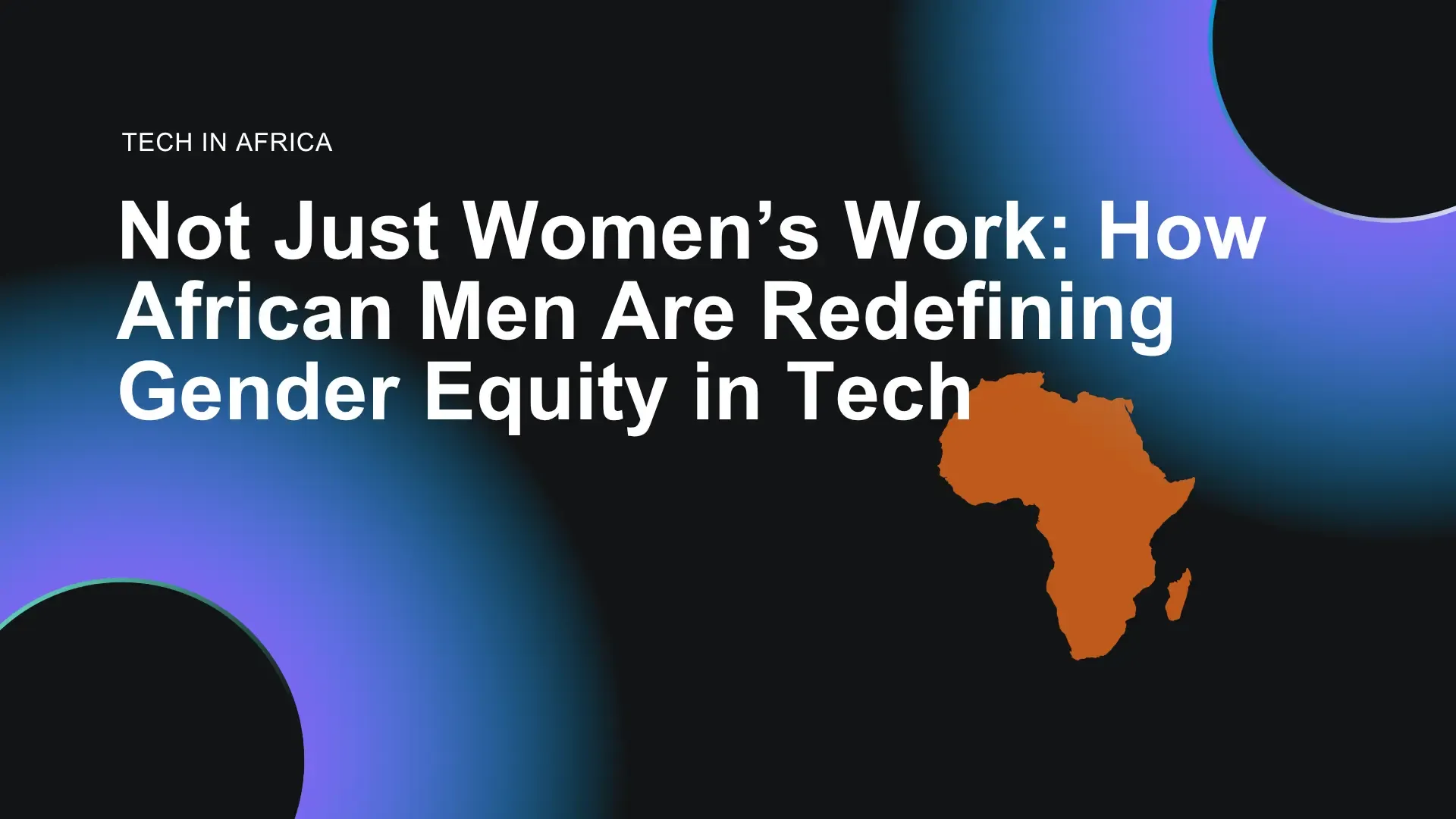The tech industry in Africa has long been lauded as a space of untapped potential but for many women, barriers persist. From disparities in funding and leadership roles, to limited mentorship and cultural perceptions, a host of obstacles hold many talented women back.
Increasingly, though, a number of male allies are stepping forward and their involvement is turning what was once a women-only conversation into a shared mission.
Where Equity Still Has Far to Go
- Across the continent, only about 20% of tech‑startups have at least one woman co‑founder, and roughly 10% have a woman as CEO. (McKinsey, 2024)
- In many countries, women in technology leadership roles remain rare. For example, in McKinsey’s analysis, South Africa and Nigeria led in the number of companies with women in C‑suite tech roles (about 17–20 %), while countries such as Egypt, Tanzania, and Namibia had much lower percentages (4–9 %).
- While Africa has a higher proportion of female entrepreneurs overall (≈ 26%) compared to many global regions, startup ecosystems in tech are still male‑dominated in founders, funding, and executive leadership.
Who Are Some of the Male Allies Making Strides
Here are several male figures who are playing significant roles as allies in tech across Africa creating opportunities, mentoring, advocating, and helping shift norms.
Akintunde Sultan (Nigeria)
Founder of DevCareer, Sultan has built one of the largest tech learning communities in Africa. DevCareer offers mentorship, bootcamps, and resources to aspiring developers, including many women, and runs laptop‑support programmes to reduce access barriers.
Sim Shagaya (Nigeria)
Founder and CEO of uLesson, Sim Shagaya is one of Africa’s foremost EdTech innovators. uLesson provides interactive, curriculum-aligned learning for students across Africa through mobile apps and video lessons. His platform has reached millions of learners, improving access to quality education and supporting girls in STEM through affordable, tech-driven education.
Fred Swaniker (Ghana)
Founder of the African Leadership Group, including the African Leadership Academy (ALA), African Leadership University (ALU), and ALX Africa. Fred Swaniker’s mission is to develop a generation of ethical, entrepreneurial African leaders. His institutions have trained over 20,000 young Africans many of them women in leadership, entrepreneurship, and technology, bridging education and employability gaps across the continent.
John Kamara (Kenya)
Founder of AFI Digital and Adanian Labs, John Kamara is a serial entrepreneur leveraging AI, blockchain, and EdTech to reshape learning across Africa. His work integrates advanced technologies into classrooms and learning platforms, promoting digital literacy, STEM education, and equal access for both men and women in the tech space.
Tobi Akinrinmade (Nigeria)
A digital marketing professional and the founder of Girls into Tech, an initiative empowering young girls to pursue careers in technology. Girls into Tech has impacted over 5,000 girls in Africa and beyond. With more than four years of experience in digital marketing (content marketing, SEO, email marketing, social media, website management), Tobi blends technical skills with marketing strategy to build awareness, provide access to training, mentorship, and community support.
Temo Kenosi (Botswana)
Founder of Ngwana Enterprises, creators of Ngwana Smart Learning, Temo Kenosi is redefining early childhood education through technology. His company develops digital learning tools and content in local African languages to boost literacy and numeracy for children in underserved communities, with a focus on improving access for girls and rural learners.
What Male Allyship Looks Like in Practice
These men (and more like them) are making change in ways such as:
- Mentorship & Training: Running or supporting programmes that teach coding, design, digital marketing, data skills etc., particularly for women or mixed cohorts, helping build confidence and technical capability.
- Reducing Access Barriers: Providing laptops, scholarships, free or subsidized training or no‑code tools; helping women who might otherwise be excluded because of cost, geography, or prior lack of resources.
- Advocacy & Policy: Speaking up in company or public settings for gender‑inclusive hiring, fair promotion, inclusive teams.
- Visibility & Sponsorship: Amplifying women’s voices, giving women platforms, inviting them to speak, ensuring they are represented in panels, leadership teams etc.
Why More Male Allies Are Essential
- When men in leadership walk the talk especially in tech firms, universities, government they help reshape norms: who gets hired, who gets promoted, whose voice is heard.
- Because many existing structures (funding, leadership pipelines, corporate culture) are male‑dominated, male allies often have the access and influence needed to open doors.
- Equity doesn’t just benefit women: more diverse teams yield better innovation, broader market understanding, more sustainable growth. Data shows companies with greater gender diversity in leadership often perform better.
Looking Forward: What Needs to Happen
- Identify and celebrate more male allies across more regions especially in Francophone Africa, East Africa, North Africa so that young women can see many role models.
- Institutionalize allyship through company policies: quotas or targets, structured mentorship/sponsorship programmes, enforced inclusion in hiring and promotion, transparent metrics.
- Support programmes that reduce resource gaps free or subsidised training, access to devices/internet, no‑code tools.
- Measure outcomes rigorously: track female representation in startup founding, leadership, funding, tech roles; also retention and career advancement over time.
- Cultural change & awareness: education in schools, awareness campaigns, male leaders speaking openly about gender equity, addressing stereotypes, and encouraging girls early into STEM.
Gender equity in African tech is not a project or a checkbox, it’s foundational to what the industry can become. The growing number of male allies is helping demonstrate that when men use their skills, networks and influence in partnership with women, change accelerates. The shift from seeing equity as “women’s work” to something shared sends a powerful message: that inclusion, fairness, and opportunity are not just moral goods they are smart strategy for innovation and growth across the continent.
